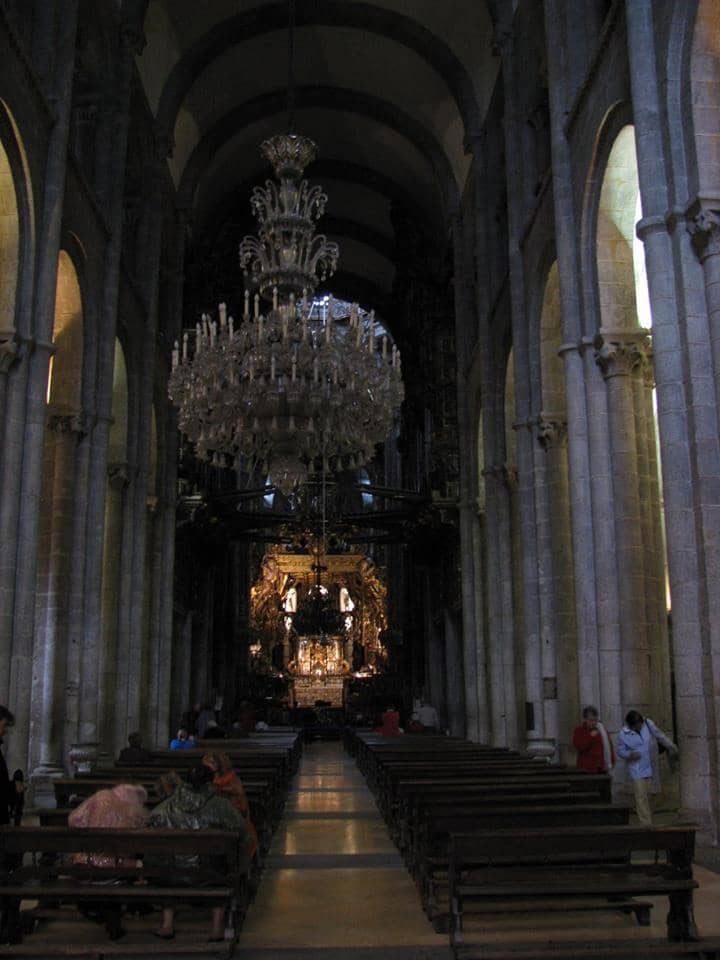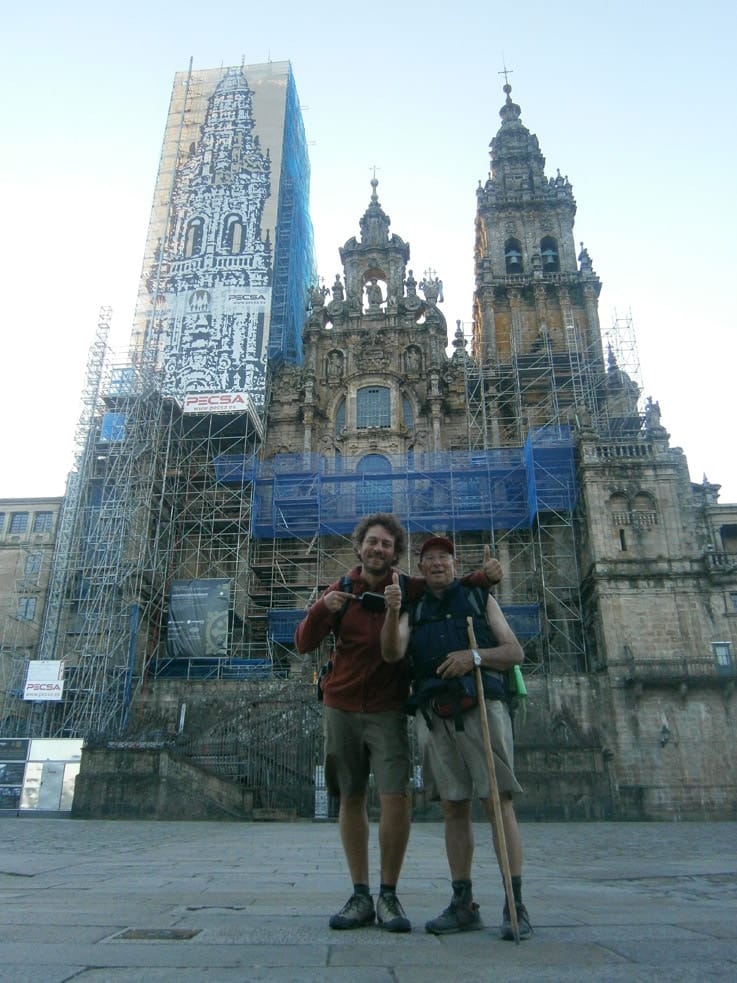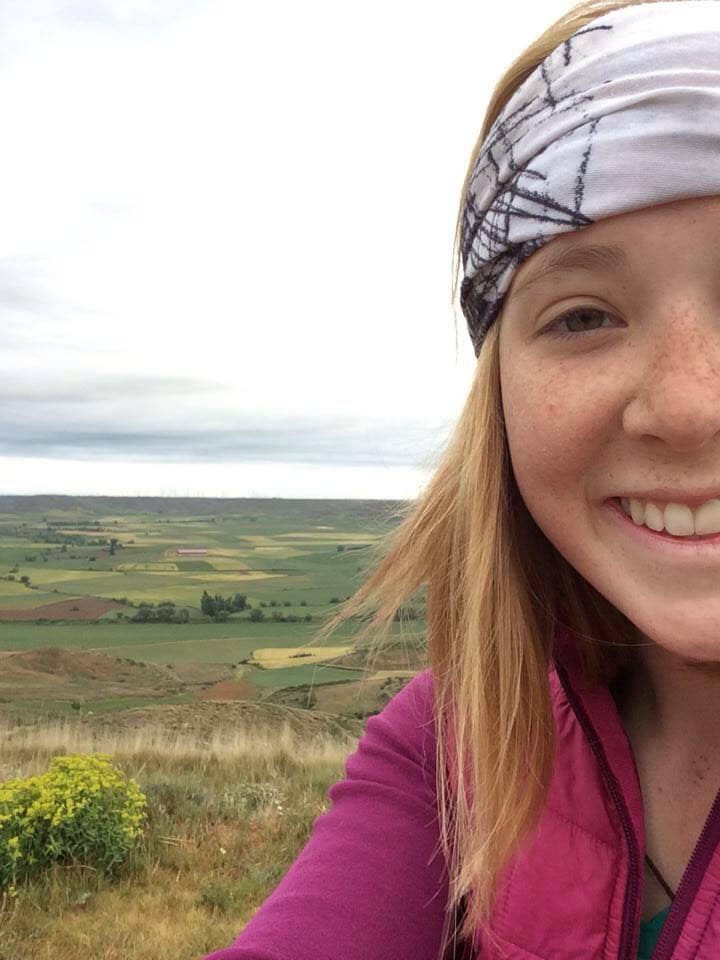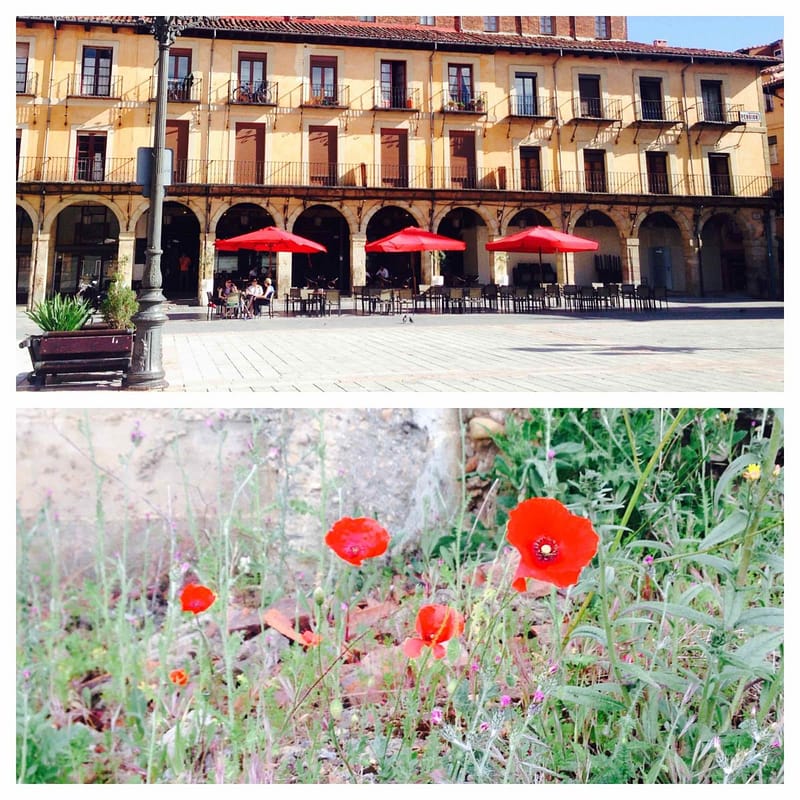“I hiked the Camino Francés in both 2006 and 2008. However, in 2008, I decided to go ‘all-in’, and take on, in one shot, in excess of 1,600 kilometres from Le Puy to Santiago. I found the sections in France and Spain to be wildly different, in terms of landscape, weather, company, peacefulness, and crowdedness, and my own willingness to be, as they say, ‘hard-core.’
After leaving the magnificent Le Puy, my first day’s 24-kilometre walk rather felt like thirty. Ever the genius, I packed a 12-kilogram backpack – not recommended. As the days wore on, I wound up walking quite a few 30+ and 40+ kilometre days, always carrying that anvil of a backpack. And, then, there was the rain! My photos from nearly each day I walked in France featured cloudy skies. On some mornings, there was no sign of rain, at least after a brief morning shower. Unfortunate phrase. I would have my morning shower, breakfast, and go off, on my way. And, the heavens would open – more showers. You’d think that that was it for the day, but, then, I also had a shower in the evenings — heck! This is confusing; hang in there. Most of the time, it rained enough to create rivulets out of the trails; puddles coalesced into mini lakes; rivers became swollen. But, spring was gathering strength: naked trees became clothed in opulent, leafy mid-thigh gowns, and bare earth draped in sylvan themes. And, eventually, yes – sometimes the skies managed to lose the clouds and become cerulean blue, replete with birds tweeting (those darn smart phones). However, the rain kept coming, and that nascent spring was just one big tease.
Then, at some point, my heels and feet were feeling the burn. I had given up counting kilometres by then. Anti-inflammatories became the order of the day: not great for the tummy. Luckily, in rural France, there was all this food: all you can eat, and not put weight on because you’re walking all day long. When I say eat – there are solid foods, and there are liquid foods. Let’s see… I was amused when I passed a town named ‘Condom’ – just an ordinary town: snigger, snigger. The French word is préservatif (had to look it up!), so it was a lot more amusing to us Anglophones. It turns out the town’s name was from the Gaulish: ‘market at the confluence (of rivers).’
I did have some good walking friends, during my time in France, whom I called my “three musketeers.” After some time walking, and getting to enjoy each other’s company, we split up. Luckily, at the refuge in Navarrenx, I caught up with them, and we joined in a celebratory dinner in a nearby restaurant. Happy days are here again! I felt almost nostalgic, knowing the scenery in Spain would be dramatically different, and that made me snap-happy: a green field. Snap. A horny cow in a paddock. Snap. A playful cloud … Snap, snap, snap. I’d have to remember that place!
The night before I arrived in Saint-Jean-Pied-de-Port, at a guest house and pub in Ostabat, run by Daniel, I reveled in being alive. Sadness would hit in St Jean, however, as the musketeers would have to go their separate ways. We had another celebratory dinner, and toasted our friendship. I realized, halfway through my journey, that this is what the Camino engenders – lasting appreciation of fellow humans. We are all passengers on this mother-ship Earth. We should look after our ship, and our shipmates; we should be joyful. Life is too short for sadness.
The very next day, I also realized my journey was going to change drastically. Around 150 pilgrims – some in groups accompanied by guides – left St-Jean for Roncesvalles. This did not bode well for the lodgings further along the Camino. The Spanish refuges or hostels (albergues) are very reasonably priced. They vary, in both cost and quality. More often, they are austere dormitories. Why do pilgrims mob them? Possibly the economy, camaraderie, but also they are sometimes the only accommodation for miles. What bugged me is that in the race to get cheap lodging, the camino becomes a quasi-competition for some. A too-frequent phenomenon I noticed was pilgrims leaving at or before dawn to arrive and reserve space at the next cheap albergue. For example, at Larrasoaña, the 6€ albergue opened at 3 o’clock, and I arrived just after midday. Good timing, right? Nope – there was already a goodly group of pilgrims, who had raced there before me, patiently waiting for the doors to open. Many later arrivals missed out. It was a pattern for much of the trip. Not at all like my Camino in 2006. Eventually, I became wary of the multitudes, and sought to stagger my daily stages, staying at less popular places.
Wherever you find yourself, it is important to smell the proverbial roses. I cooked up quite the meal for my group in Pamplona: the menu was pasta Bolognese with mushrooms, green salad with Italian dressing, black grapes, and red wine. Intended for a group of four, but well in excess. We noticed an elderly French pilgrim eating a large watermelon. That was going to be his dinner. I offered the Frenchman a plate of pasta, and a plate of salad. In return he shared his watermelon. I could not find a corkscrew for the wine; he had one. We shared the bottle: long live the United Nations of pilgrims! He thanked me profusely, and I thanked him. Respect, and the desire to share, makes the world go round. Those were the sort of personal experiences that I cherished.
However, not all pilgrims are created equal. Let me tell you of what I called the ‘Swilgrims.’
I was in Puente la Reina, at the same hostel where I enjoyed a stay in 2006. They still served a half-litre glass of wine for dinner. Delightful practice, even if the wine was not so delightful. I was called to interpret for a ten-strong group of anxious, Swedish elderly female pilgrims. I did so, splendidly. Nevertheless, they were barely thankful. And, none of them even bothered to reply to my polite ‘good morning’ the next day. I continued to have nice experiences with other pilgrims, but, every now and then, I would run into those Swilgrims, to my growing displeasure. In Los Arcos, we ended up in the same hostel again. The Swedish oldies got up far too early, and annoyed us with their loud chatter, and grumbling, and excessively LONG showers. They used up all the hot water. Memo to those Swedes: stay in a hotel next time, tourist-pilgrims! Similar uncourteous, selfish, and rude behaviour followed in their wake for the next several days, and I’m sure few on the Camino appreciated them.
Through the race for beds, intermittent pilgrim rudeness, and the shooting pains in my heels and feet, I always tried to find things to appreciate, like music. At one hostel, no pills I’ve taken could prevent me from occupying the front seat of an incredible performance: the snorer section of the Pilgrimous Orchestra was winding up their nocturne, such sonorous efforts not deflated by the mighty wind section. As it was all building to a crescendo finale, unable to sleep, I escaped that place at first daylight.
I had a rest day in Grañon, the same hostel where I stayed two years beforehand, which allowed me to escape the Swilgrims. My big mouth let slip to the hospitaleros, Lilly and Andreas, that my wife and I had cooked, two days running, for the multitudes in 2006. Given my request to have a rest day there, I was immediately roped into cooking, again, two days in a row. Both days, the main meal consisted of vegetable soup, with chorizo sausages added to bulk it up, bread and wine, green salad with vinaigrette dressing, and yoghurt for dessert. The soup was cooked in monstrously big cauldrons. One feeble burner suffered from lack of gas, so I had to switch the ‘pots’ mid-cooking. Not enough room in the kitchen for helpers, so I acquired a dodgy back for a week from all that lifting! The next morning, some pilgrimettes asked whether my profession was a chef, or a cook. Having learnt that I happened to be a specialist dentist in Australia, their ‘interest’ was piqued. I rescued myself using the magic incantation: ‘Ladies, I am happily married.’ End of interest. The soup, however, received enduring interest: I was asked for the recipe. None of the 65 pilgrims the first night, and the 54 on the second, died, or were ill from the food cooked by yours truly. I count that as a success.
By the time I reached Burgos, the pain in my feet caused me to realize that ‘pain’ dominates Spain (four-fifths, the one fifth being just the ‘S’). To bus, or to abandon the trek, that became the question (sorry, Old Will – please, don’t roll in your grave again). I bussed, around 200km in a day – a feat worthy of a super-Swilgrim. Ashamed, as I ever will remain, but it was the only way. For just over 4€, I sold my sole to the Swilgrim Badass. Ten minutes into my bus journey, I knew why the fare was so low. The bus had a mechanical breakdown, right behind the municipal albergue. Several hours after I had left that same albergue, via the transit centre, I arrived to a stop just a kebab’s throw from it. Oh, how we laughed. Not. It took an hour before a replacement vehicle was rustled up, and we were on our way, once again. The Meseta, resembling a vast paella dish, appeared as an uncharacteristic, vivacious green expanse, having been soaked for days. The low clouds, and intermittent downpours, only allowed glimpses of the distant rim of mountains.
Arriving in León, my mission was to find the inner soles that would allow my feet to finish this Camino. At the orthopaedic shop, some four hundred metres away from the YMCA I stayed in, for 25€, I held two softest silicone shapes in my trembling hands: salvation from sore feet was mine. ‘I will finish the Camino!’ I exclaimed. ‘I will sip cider in Santiago!’ I shouted. ‘I will no longer succumb to swilgrimage!’ I cried. Promises, promises. Thus expiated, becalmed I became, but no less determined.
The closer to Santiago I came, the more crowded the trail, and the lodgings became. On one occasion, my deep sleep was interrupted at 5:30am. The early-bird pilgrims started to shuffle the ubiquitous plastic bags. Waterproof plastic is the currency of waterlogged Galicia, and pilgrims in general. Plastic bags not only keep things dry, but also compartmentalised. We were at the gates of Galicia (just days from the climb of O Cebreiro), but the precipitous rain blessed the walkers, everywhere. The more plastic, the better. Maybe not for my ears, or sleep. But you stay dry, pilgrims, you stay dry. This is not to say I didn’t have delightful encounters with many of those people – I had a great time meeting dozens of them. But the interesting and congenial pilgrim at midday could very well be your worst enemy at 5:30 in the morning.
As I waited to enter an albergue in Ponferrada, I was touched by the accommodation plight of an Italian girl, who had started her pilgrimage from Lourdes. Almost immediately, as she started on her way, a stray dog trailed her. After a couple of days, she made enquiries about her new companion, found there was no registered owner, and proceeded to care for the pooch. The animal was in a crisis. A visit to the vet, and adoption papers later, Frieda, the Camino pup, and her new owner, became inseparable. Despite this, she couldn’t stay there. I found it a shame that many albergues admit boisterous and, at times, obnoxious pilgrims – swilgrims even! – yet, a gentle animal like Frieda had to miss out. Them is the rules, the old Scottish hospitalero insisted. In case you thought him hard-hearted, when he signed me in, he got up to shake my hand, having seen that I started my pilgrimage all the way back in Le Puy. The moment was lost on the bickering plebs behind me, who shoved me out of the way as they fought to obtain their precious 5€ beds. Nights in packed quarters like that, sleeping with fifty, sixty, or even more pilgrims, did not go altogether well. Those large dormitories often had their windows shut, doors closed, and smells trapped.
Ultimately, I made my way to Santiago. I must say the journey, the daily sights, smells, sounds, celebrity chef-ing, the daily adventures, did more for me than the destination. I went onward to Finisterre, but rather than revelling in the rained-out pagan rituals at ‘the end of the world’, I returned to spend my time in contemplation, in the dry atmosphere of the Santiago Cathedral. Despite the hordes of tourists, a few devoted locals, and an army of pilgrims, that church provides many a quiet nook for prayer. Everyone in that chapel has implicit trust in the Divine Being; far less trust was placed in the blokes that installed the chandelier – no one wanted to sit right underneath it (see photo).
And that, my friends, is a wrap on my 2008 Camino. I have so many remarkable memories from that two-month journey that I had to commit it to ‘electronic’ paper. I wanted to write volumes about my trip, but, so far, managed only a hundred pages. It seems that everyone is doing the same, these days. Nevertheless, I look forward to publishing it someday … However, for now, these musings will do nicely, methinks.”
-“Chef” John, Australia




